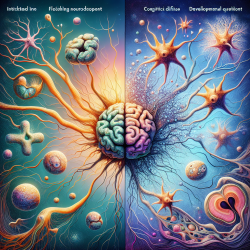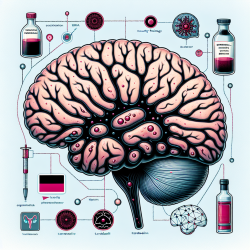In the realm of rare diseases, Hurler syndrome, or mucopolysaccharidosis type I (MPS IH), stands as a formidable challenge. It is a severe, neurodegenerative condition that leads to rapid cognitive decline and multi-system dysfunction if left untreated. Recent research has provided new insights into the neurodevelopmental outcomes of untreated children with Hurler syndrome, offering crucial information that can guide practitioners in improving their therapeutic approaches.
The Importance of Comprehensive Cognitive Assessment
The study titled Beneath the floor: re-analysis of neurodevelopmental outcomes in untreated Hurler syndrome, conducted by Shapiro et al., re-evaluates previous cognitive assessments using modern methodologies. Traditional assessments often reported scores with a minimum cutoff of 50, which obscured the full extent of cognitive impairment in advanced stages of the disease. By applying developmental quotient analysis based on age-equivalent scores, researchers have uncovered a more accurate depiction of cognitive decline.
Key Findings and Their Implications
- The study analyzed 39 observations from 32 patients with untreated Hurler syndrome.
- Findings revealed that many children fell into the severely to profoundly impaired range below the traditional cutoff score of 50.
- The rate of skill loss was quantified at approximately 14 points between ages one and two.
These findings emphasize the need for practitioners to consider developmental quotients rather than relying solely on norm-based scores. This approach provides a more comprehensive understanding of a child's cognitive abilities and can inform treatment plans more effectively.
Advancing Therapeutic Strategies
The insights gained from this study are particularly valuable as newborn screening and innovative therapies become more prevalent. For practitioners, these data serve as a benchmark for developing treatments in areas where hematopoietic cell transplantation (HCT) may not be available. Understanding the natural history of untreated MPS IH is crucial for evaluating the efficacy of emerging therapies and tailoring interventions to individual needs.
Encouraging Further Research
This study highlights the importance of continued research into neurodegenerative diseases like Hurler syndrome. Practitioners are encouraged to delve deeper into this field, exploring new methodologies for assessing cognitive decline and developing novel therapeutic approaches. Collaboration with researchers and participation in clinical trials can further enhance understanding and treatment outcomes for patients with MPS IH.
Conclusion
The re-analysis of neurodevelopmental outcomes in untreated Hurler syndrome provides a clearer picture of cognitive decline than ever before. By embracing modern assessment techniques and fostering ongoing research, practitioners can significantly improve care for individuals with this challenging condition. As we stand at the dawn of newborn screening and new therapies, these findings offer hope and direction for future advancements in treating Hurler syndrome.
To read the original research paper, please follow this link: Beneath the floor: re-analysis of neurodevelopmental outcomes in untreated Hurler syndrome.










